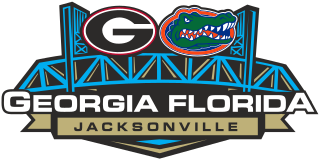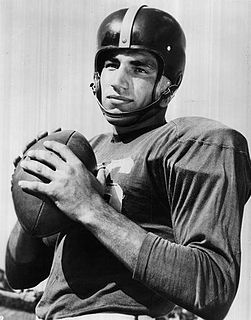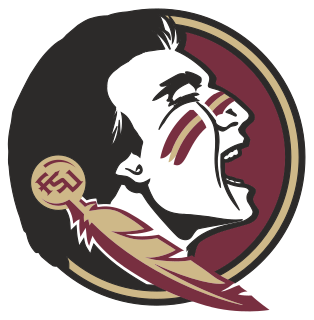Related Research Articles

The Florida–Georgia football rivalry is an American college football rivalry game played annually by the University of Florida Gators and the University of Georgia Bulldogs, both members of the Eastern Division of the Southeastern Conference. The programs first met in 1904 or 1915 and have played every season since 1926 except for a war-time interruption in 1943. It is one of the most prominent rivalry games in college football, and it has been held in Jacksonville, Florida since 1933, with only two exceptions, making it one of the few remaining neutral-site rivalries in college football. The game attracts huge crowds to Jacksonville, and the associated tailgating and other events earned it the nickname of the "World's Largest Outdoor Cocktail Party", although that name is no longer used officially.

Tampa Stadium was a large open-air stadium located in Tampa, Florida, which opened in 1967 and was significantly expanded in 1974–75. The facility is most closely associated with the Tampa Bay Buccaneers of the National Football League, who played there from their establishment in 1976 until 1997. It also hosted two Super Bowls, in 1984 and 1991, as well as the 1984 USFL Championship Game.

Ben Hill Griffin Stadium, popularly known as "The Swamp", is a football stadium on the campus of the University of Florida in Gainesville and the home field of the Florida Gators football team. It was originally known as Florida Field when it opened as a 22,000 seat facility in 1930, and it has been expanded and renovated many times over the ensuing decades. Most of the university's athletic administrative offices, along with most football-related offices and training areas, have been located in the stadium since the 1960s. Most of the football program's facilities are slated to move to a nearby $60 million building that began construction in 2020.

Richard Jose Casares was an American college and professional football player who was a fullback in the National Football League (NFL) and American Football League (AFL) for twelve seasons during the 1950s and 1960s. Casares played college football for the University of Florida, where he was standout fullback and kicker. Casares played professionally for the Chicago Bears and Washington Redskins of the NFL, and was a member of the expansion Miami Dolphins of the AFL.

The Florida Gators football program represents the University of Florida (UF) in American college football. Florida competes in the Football Bowl Subdivision (FBS) of the National Collegiate Athletic Association (NCAA) and the Eastern Division of the Southeastern Conference (SEC). They play their home games in Steve Spurrier-Florida Field at Ben Hill Griffin Stadium on the university's Gainesville campus.

Earnest Graham Jr. is an American former college and professional football player who was a running back in the National Football League (NFL) for eight seasons. He played college football for the University of Florida, and was signed by the Tampa Bay Buccaneers as an undrafted free agent in 2003. Graham became a favorite among Buccaneers fans, coaches, and fellow players for his hard work and team-first attitude.

The Florida State Seminoles football team represents Florida State University in the sport of American football. The Seminoles compete in the NCAA Division I Football Bowl Subdivision (FBS) of the National Collegiate Athletic Association (NCAA) and the Atlantic Division of the Atlantic Coast Conference (ACC). The team is known for its storied history, distinctive helmet, fight song, colors, and many other traditions associated with the school.
Kerwin Douglas Bell is an American football coach and former player who is currently the Head Coach of the Western Carolina Catamounts football team. Bell was born in the North Central Florida town of Live Oak and was a star high school football quarterback at Lafayette County High School in nearby Mayo, Florida. Bell did not attract the attention of top college football programs while playing at the small high school, so he decided to attend the University of Florida in nearby Gainesville and joined the Gators as a walk-on.

The Florida–Florida State football rivalry is an American college football rivalry between the teams of the two oldest public universities of the U.S. state of Florida: the University of Florida Gators and Florida State University Seminoles. Both universities participate in a range of intercollegiate sports, and for the last several years, the Florida Department of Agriculture and Consumer Services has sponsored a "Sunshine Showdown" promotion that tallies the total number of wins for each school in head-to-head sports competition. However, the annual football game between the Gators and Seminoles has consistently been the most intense and notable competition between the in-state rivals.

Andrew Douglas Owens, Jr., nicknamed Andy Owens, is an American attorney, former state court judge, and former college basketball star.

The Tampa Bay area is home to many sports teams and has a substantial history of sporting activity. Most of the region's professional sports franchises use the name "Tampa Bay", which is the name of a body of water, not of any city. This is to emphasize that they represent the wider metropolitan area and not a particular municipality and was a tradition started by Tampa's first major sports team, the original Tampa Bay Rowdies, when they were founded in 1975.

James Adger "Jack" Forsythe Jr., nicknamed "Pee Wee" Forsythe, was an American college football player and coach. Forsythe has an important place in the history of college athletics in the U.S. state of Florida as the first head coach of the team now known as the University of Florida Gators. He had previously been the last football coach at Florida State College, now Florida State University, before it was reorganized as a school for women.
The Tampa Spartans football program was an intercollegiate American football team for the University of Tampa (UT) located in Tampa, Florida, that began play in 1933. The program competed against other small college programs in the forerunner of today's NCAA Division II for almost forty years before moving to the top level of NCAA Division I as an independent in 1971. Successfully competing against top college programs as a much smaller school put an enormous strain on the university's finances, and the school decided to discontinue football after the 1974 season.
The 1906 Florida football team was the first intercollegeate football squad fielded by the University of Florida, which was established in 1905 and opened its new Gainesville campus for the 1906–1907 academic year. Florida was a member of the Intercollegiate Athletic Association of the United States (IAAUS) but was not yet affiliated with an athletic conference. The university had not yet constructed on-campus sports facilities, so until 1911, its football and baseball teams played and practiced at a municipal park near downtown Gainesville known simply as The Ballpark.
The 1904 University of Florida Blue and White football team represented the University of Florida in Lake City in the sport of American football during the 1904 college football season. This was neither the modern University of Florida nor the modern Florida Gators, but a team fielded by one of its four predecessor institutions that had been known as Florida Agricultural College until 1903. They were led by player-coach Marvin O. Bridges, whose brothers also played on the squad.

The 1902 East Florida Seminary football team represented the East Florida Seminary in Gainesville, Florida in the sport of American football during the 1902 college football season.
The 1903 East Florida Seminary football team represented the East Florida Seminary in Gainesville, Florida in the sport of American football during the 1903 college football season. This was not the modern Florida Gators of the University of Florida, which began in 1906, but one of its four predecessor institutions. The team split two games with the University of Florida at Lake City, defeated in-state rivals Florida State College and Stetson by identical scores of 16 to 0, then wrapped up the campaign with a tie and a loss to an amateur squad from Tampa.
The history of Florida Gators football began in 1906, when the newly established "University of the State of Florida" fielded a football team during its first full academic year of existence. The school's name was shortened to the University of Florida in 1908, and the football team gained the nickname "Gators" in 1911. The program started small, usually playing six to eight games per season against small colleges and local athletic club teams in north Florida and south Georgia. The Orange and Blue developed early rivalries with the Stetson Hatters from nearby Deland and Mercer Bears from Macon. During the 1910s, Florida began playing a wider range of opponents from more established football programs across the southeastern United States and faced off against several future rivals - such as Georgia, Georgia Tech, South Carolina, and Auburn - for the first time.
The East Florida Seminary was an institution of higher learning established by the State of Florida in 1853, and absorbed into the newly established University of Florida in 1905. The school operated in Ocala from 1853 until 1861. After being closed during the Civil War, the school re-opened in Gainesville, Florida in 1866.
References
- 1 2 "Polk's First Football Game". Lakeland Ledger. November 24, 2002.
- ↑ Armstrong, Orland K. (1928). The life and work of Dr. A.A. Murphree. Gainesville, FL: University of Florida. p. 41. Retrieved 20 April 2019.
- ↑ "Clipped from the Tampa Tribune". The Tampa Tribune. 19 November 1904. p. 1.
- ↑ America's Lost Colleges